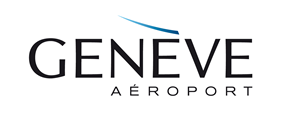 Go to summary
Go to summary
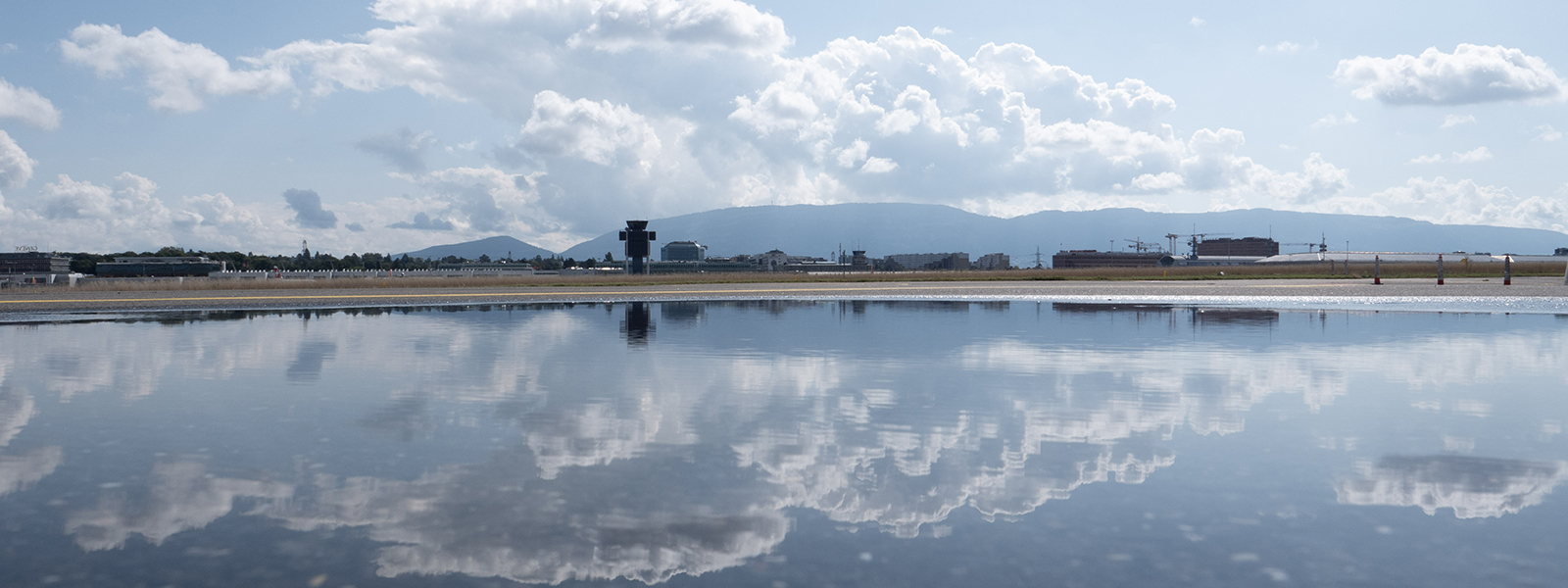
Responsible, sustainable and committed, despite the crisis
In September 2020, the airport presented its commitments in the social, environmental and economic fields with the publication of its 4th sustainable development report, in digital form for the first time.
human resources
protecting employees’ health
Faced with the health and economic crisis, as well as the major phases that marked 2020 – lockdown, coming out of lockdown, the resumption of activities, followed by the second wave and mothballing phase – Genève Aéroport has experienced several successive transformations. In particular, General Management, the Covid Task Force and Human Resources piloted and coordinated these phases of restructuring and maintaining essential activities.
On 17 March 2020, the Federal Council decided on a lockdown for the Swiss population. The population was called on to stay at home, but Genève Aéroport remained open and operational 24/7. Within a few days, the structure of airport staff had to be completely redesigned. It was essential to determine which employees needed to remain on site to continue operations, and which could work remotely. It was also a priority to protect vulnerable individuals, slow down certain activities and introduce reduced working hours. A difficult task, since the airport site has 1,040.9 full-time equivalent (FTE) positions representing more than 200 different professions. In April, 45% of the hours worked by Genève Aéroport employees were undertaken from home. In May, this rate lowered to 40%. Throughout the year as a whole, 16% of hours worked were from home.
2020 has fundamentally changed the company and has given a boost to new forms of organising work, in particular working from home, both technologically as well as in terms of regulation and organisation. Genève Aéroport had already embarked on this path before the pandemic, testing out a pilot project for working from home, with more flexibility, several days a week. Postponed due to the year’s events, this project will be relaunched in 2021.
All decisions related to the restructuring of staff planning were taken with one overarching priority: the safety and health of all. Vulnerable people were called on to stay home, with a 100% salary guarantee and care from the company’s occupational doctor. Those with childcare considerations were able to benefit from five additional days of specific leave. Committed to sustainable transport, during this period the airport made it easier for employees to travel by car for health reasons by offering parking spaces and extending existing parking space subscriptions.
Protecting the health of employees has always been at the heart of our actions. From March, hand sanitising gel and personal protective equipment were distributed to employees. Plexiglass screens were installed in the airport to protect employees in contact with customers. The maximum capacity of all common work areas was also displayed. FOPH information campaigns with the safety measures to be observed were highlighted and relayed to employees throughout the pandemic through regular newsletters.
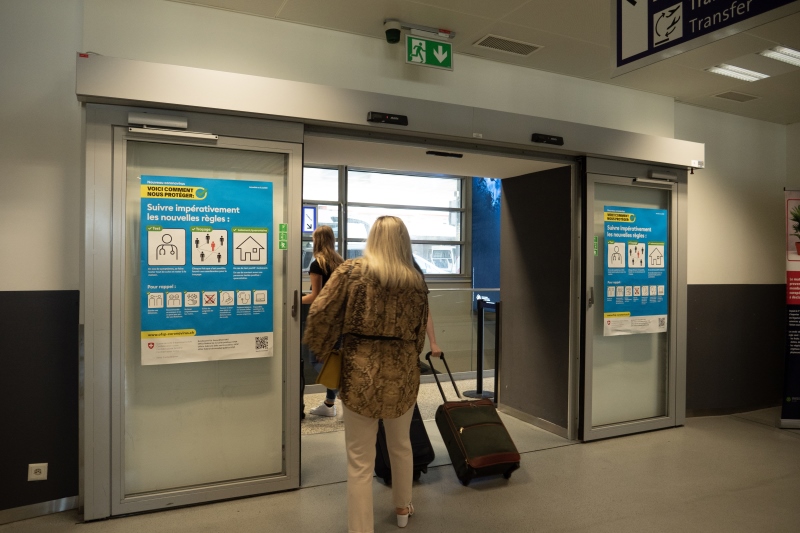
A protection plan was put in place to guarantee health and safety in the airport with regard to passengers and employees alike. Approved by the Federal Office of Public Health (FOPH), this document has been regularly updated. Thanks to this plan, on 8 October 2020, Genève Aéroport achieved Airport Health Accreditation (AHA).
Through its new partnership with insurer SWICA, an external psychological support unit was set up for employees in autumn and strengthened for winter 2020, and this will stay in place for as long as is needed.
Economic measures for the sustainability of genève aéroport
Informing employees and transparency were key considerations for General Management in 2020. The usual information sessions with all staff in the media room were replaced by video conferences. Four conferences were organised in total over twelve months. This allowed members of General Management to regularly take stock of air traffic, the financial situation and the organisation of the airport. This system allowed employees to ask questions anonymously, especially regarding the future of their employment.
The health crisis has created serious financial difficulties for the airport. Cost-saving measures have been put in place to ensure the longevity of the airport. From mid-March, short-time working was introduced. Over the period from April to November, the average level of RWH (reduced working hours) reached 29.6%. In terms of staff, fixed-term contracts have not been renewed and early retirements have been encouraged. These measures, combined with reductions in operating expenses and investments, made it possible to avoid collective redundancies in 2020. Recruitment was frozen and replacements following natural departures were limited to what was strictly necessary.
The company's workforce has decreased from 1,070 FTE on 31/12/2019 to 1,041 FTE on 31/12/2020, although the period from January to March 2020 has seen several instances of recruitment. Each instance was subject to prior approval by General Management and internal mobility was favoured as far as possible. In 2020, 44.3% of the posts advertised were filled internally compared to 36% in 2019.
« The cost-saving measures implemented made it possible to avoid collective redundancies in 2020. »
Welcome and training online
To adapt to health recommendations and continue to guarantee a personalised welcome to any new employees joining the company, this year, the welcome concept was adjusted to limit people gathering. As such, the usual integration week was digitised. This change to the welcome with more online content is due to be finalised in 2021.
On the podium for best employer
Despite these extraordinary circumstances, Genève Aéroport was voted 2nd best employer in the public and semi-public entities category by Bilan magazine. This very satisfactory result demonstrates the airport’s clear commitment to areas such as salaries, promoting health, training, CSR policy and work time arrangements, which make up HR practices. The airport has improved its ranking after already achieving 3rd place in 2019 and 4th in 2018.
The Friendly Workspace label, awarded to Genève Aéroport for the first time in 2013, was renewed in 2020. This recognition from Promotion Santé Suisse confirms that the company has been continuously improving its processes in occupational health and safety management over the past three years.
Governance and external relations
Ethics and conflict of interest systems and protection of the person
In 2020, Genève Aéroport continued its efforts to update its standards and procedures relating to ethics and conflicts of interest. The directive on the prevention and management of conflicts of interest, issued in 2018, was revised in 2020. In addition, an alert system was put in place in 2020, allowing all staff to communicate any behaviour considered inappropriate either to internal representatives or via a secure platform.
Other actions have also begun, such as the development of a code of conduct, the establishment of a fraud reporting platform, the creation of an ethics committee, the strengthening of the purchasing training procedure and the implementation of an e-learning training module relating to the conflict of interest directive, intended for all Genève Aéroport employees.
All these measures, supported by the Board of Directors, respond directly to the recommendation made by KPMG in its 2019 report.
In 2020, a programme of training days on protection of the person was launched with a view to inform employees of the amendment made to the regulation on the protection of the person, introduce the implementation of this process in the event of personal injury, explain the role of the external person of trust and make managers aware of their responsibilities in matters of protection of the person. A video summary was also created for employees about ways to report inappropriate behaviour.
« An alert system has been put in place all employees to report any behaviour that is considered inappropriate. »
success of easa certification audit
The Safety Office works daily to improve the safety of operations. In November 2020, the airport's infrastructure received certification for meeting European Aviation Safety Agency (EASA) standards. Conducted by the Federal Office of Civil Aviation (FOCA), this recertification audit verifies that airport processes meet safety requirements and that the aerodrome operator applies these processes as outlined on paper. In particular, these requirements describe the way in which an aerodrome is supposed to organise the refuelling of aeroplanes, firefighting services, periodic checks of runway conditions, landing lights and clearing snow. Over three days of video conference interviews, 36 employees at Genève Aéroport and third-party companies were audited as part of the revalidation of aerodrome certification (EASA (EU) no. 139/2014).

New fire services act
On 30 October 2020, the Grand Council of Geneva adopted a law to change the organisation of fire services in the canton. The Fire and Rescue Service (SIS) will now be governed by a new inter-municipal structure. For the ARFF, this new law has clarified the partnership between the two professional entities of fire services. Collaboration agreements should be concluded to consolidate the many synergies in place in the operational and training fields.
External relations: anticipating in order to adapt
The global pandemic has required changes in international norms and standards to be monitored constantly, particularly when it comes to adapting to provisions relating to travel rights and constant national health changes. Close relationships with federal and European regulators have been nurtured to adapt airport services.
Alongside this, information sessions have been launched to inform partners of the situation linked to the pandemic. The 100th anniversary festivities also served to strengthen links between the airport and local authorities – particularly at the launch ceremony on 28 February 2020, and later through photo exhibitions which made it possible to consolidate relationships with key stakeholders in local tourism, as well as with neighbouring France (with the tribute to the 1956 agreement, which extended the runway by 3.9km thanks to an international agreement between France and Switzerland).
Sponsorship & patronage
Commitments maintained
Genève Aéroport is highly committed to the Geneva community when it comes to sponsorship and patronage. Again, the Covid-19 pandemic has had many repercussions in this area. Despite the crisis, Genève Aéroport maintained its commitments to its main sports partners (Lions de Genève and GSHC) and cultural partners (Geneva International Film Festival and the Geneva International Film Festival and Forum on Human Rights) but also to more modest local stakeholders (neighbouring municipalities). The amounts allocated were nevertheless reduced to 700,000 CHF, compared to 900,000 CHF the previous year. Many events were cancelled for the year due to the various health protection measures taken at the federal and cantonal levels.
In some cases, new types of events have taken shape, such as Geneva 20km by Genève Aéroport. With the organisers, a virtual race over three courses crossing five neighbouring municipalities was held from 1 to 22 November 2020. This innovative format was very successful, welcoming 2,884 participants: one of the highest participations in a running event in French-speaking Switzerland in 2020.
In terms of sport events, 2020 began with joy and togetherness, welcoming the delegations participating in the Youth Olympic Games (YOG) in January: the only Olympic competition that was held last year. As the official airport for the event, for nearly three weeks, Genève Aéroport hosted the arrivals and departures of a large number of the 1,880 athletes representing 79 participating countries.
In terms of sponsorship, 75,000 CHF from a budget of 100,000 CHF reserved for humanitarian, charitable and social actions were paid to Chaîne du Bonheur during their « Coronavirus Switzerland » fundraising campaign, funding projects in Switzerland to support those most affected by the virus and by the protective measures.

Environment
Limiting noise pollution for local residents
Despite the crisis, proactive, innovative actions to protect the environment and local residents have not stopped. Aware of its urban setting, Genève Aéroport proactively works to limit its noise footprint. Of course, the Covid-19 pandemic has had a strong impact on air traffic, but the results preceding the crisis are significant, resulting from a strategy applied over time. In September 2020, the results were published regarding the noise footprint of Genève Aéroport’s air traffic for the year 2019. Between 2018 and 2019, the surface area exposed to noise decreased by 3.4 km2. The number of inhabitants exposed to limit values above regulations also decreased, from 22,726 in 2018 to 20,135 in 2019. This promising result is mainly linked to an overall decrease in aircraft movements (-0.6% in 2019). In 2019, aircraft movements after 22:00 saw an overall reduction of 5.2%, while take-offs decreased by 15.5% compared to 2018.
« Between 2018 and 2019, the surface area exposed to noise decreased by 3.4 km2. »
| Noise reduction measurement indicators
|
2018-2019 variation
|
|---|---|
| Surface des zones exposées au bruit | -10.22% (-3.4km2) |
| Number of inhabitants exposed
|
-11.4% (-2,591) |
| Night movements (22:00-midnight)
|
-5.2%
(decrease in take-offs by 5.5%) |
| Category 5 aircraft
|
+36.7% |
The 2020 noise footprint will not be known until 2021. The results should be particularly favourable, as they will be directly linked to the historic, exceptional drop in air traffic resulting from the epidemic. This is especially true since the precipitous closure of borders across the world last spring did not lead to an increase in night flights. The airport’s 2020 noise footprint is therefore guaranteed not to increase.
For the sake of transparency and dialogue with the population, this year Genève Aéroport published an educational booklet about its noise curves.
The airport’s Sectoral Aviation Infrastructure Plan (SAIP) lays out the framework for the operation and future development of Genève Aéroport. To make the commitments made in this document a reality, in 2019, the airport submitted a request for the approval of plans and operational measures to the Federal Office of Civil Aviation (FOCA). The project includes operational measures that will allow the airport to stabilise and then reduce its noise footprint. In particular, the document lays out the future establishment of a quota system for take-offs after 22:00. In concrete terms, each airline will have the right to a certain number of unplanned departures after 22:00. Once this quota is exhausted, as a deterrent, the airline will have to pay a fee. This mechanism will also favour quieter planes. An additional measure is to create a rapid exit on runway 04, making more efficient use of aircraft parking spaces. Attitudes on this subject were received this year, and the airport must take a position on the subject at the beginning of 2021.
Operating since 2003, the soundproofing programme for homes in the municipalities bordering the airport makes it possible to soundproof hundreds of homes every year. In September 2017, the Federal Office of Civil Aviation (FOCA) approved a new idea. A 10-year deadline has been set for soundproofing more than 3,000 homes around the airport. Since 2004, nearly 4,028 homes have been soundproofed for a total of 56 million CHF. Due to the pandemic, the programme has experienced a slowdown. Expert reports could not be carried out for all owners, some of whom being persons at risk. In addition, many companies carrying out soundproofing work ceased their activities for several weeks.
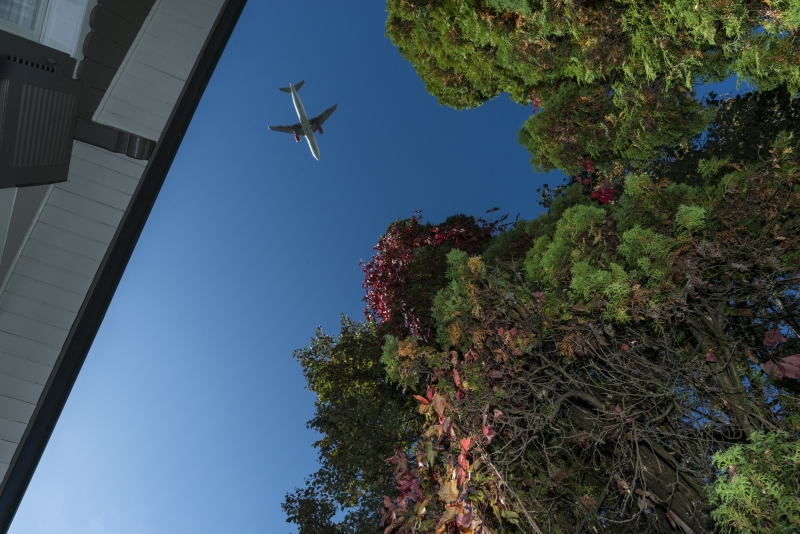
an airport accessible by public transport
Genève Aéroport has a travel plan aimed at employees. The plan encourages the use of public transport, cycling, walking and car sharing. It also aims to reduce the use of parking spaces. For this reason, in July, monthly parking subscriptions for employees increased by 10 CHF.
The airport is also committed to promoting access by public transport. Since 2018, six morning Aérobus lines have served the airport free of charge from Geneva and neighbouring France. This service is very successful but, faced with the drop in passenger traffic last spring, the service was temporarily reduced (12 trips per day instead of 20). Airport staff shuttles, reserved for employees, have also been adapted as replacement shuttles to compensate for the discontinued Aérobus service.
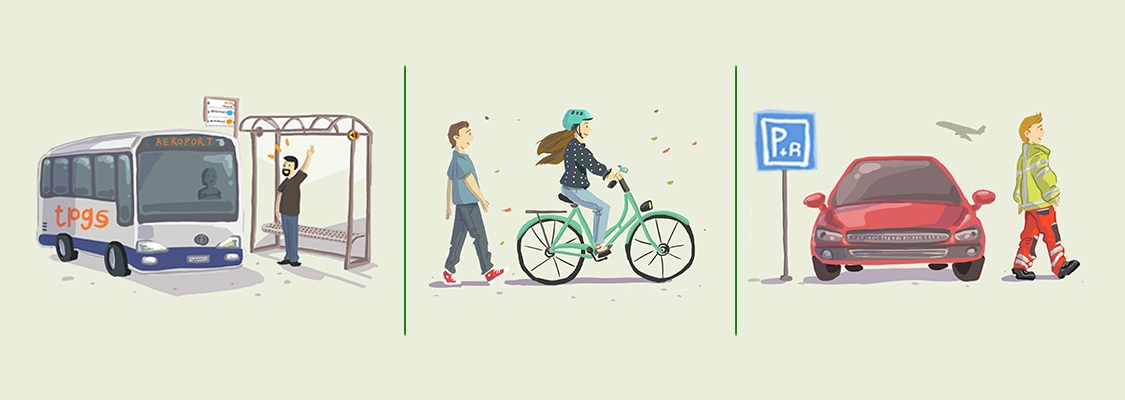
Minimising the airport’s carbon footprint
Keen to minimise CO2 and pollutant emissions from airport activities, Genève Aéroport has set itself the goal of eliminating the use of fossil fuels from all its buildings and infrastructure by 2025. The Airports Council International (ACI) has renewed Genève Aéroport's ACA 3+ carbon neutral certification for its exemplary management of greenhouse gas emissions in November 2019. In 2020, Genève Aéroport bought 8,200 tonnes of Gold standard CO2 certificates to offset residual emissions in 2019.

Improving recycling processes
Genève Aéroport manages a large amount of the waste from the 200 companies based on the site. It strives to reduce the amount of waste while improving recycling processes. In 2020, the quantity of rubbish passing through the seven waste reception centres around the site and collection points decreased significantly, mainly due to the health crisis. The airport's shops and restaurants experienced a significant drop in activity, passengers used the airport less, and employees worked from home more.
Keen to improve its recycling processes, the airport launched a FRET information campaign in November 2020. Emphasis was placed on recycling coffee capsules, and a new channel for organic waste was put into the test phase.
Preserving biodiversity on the airport’s meadows
Genève Aéroport is the largest « flora priority site » in the canton because of the many rare species that grow on its 137 hectares of meadows. As its certification by the Fondation Nature & Économie attests, the airport site is committed to preserving this biodiversity. Invasive plants are therefore regularly removed from the meadows. This year, a manual uprooting campaign was run targeting the annual fleabane.
In addition, the airport’s meadows are mowed several times a year by farmers in the region. The waste is then composted and recycled as fertiliser on fields in Bellevue and Collex-Bossy.
Mowing the meadow at the airport
Every five years, the airport carries out an analysis of the quality of its soils. Last July, twenty-two samples were taken, and no significant increase was found in the overall level of pollution on the airport site. The samples showed levels comparable to 2013. However, heavy metals (copper, zinc and lead) were detected in the immediate vicinity of the runway, with the density decreasing with distance.
Genève Aéroport is equipped with an air quality monitoring station and, since 2018, has been equipped with a device for measuring very fine particles (PM2.5). Installed at the edge of the runway, it monitors immissions in the airport area. Specific data is available on the Transalp’Air website.
In addition, an air quality measurement campaign was launched between April and June. The aim was to measure the air during the pause in air traffic, and again when normal traffic resumed. Due to the current health situation, it is taking longer to process the results. The results will be available in 2021.

